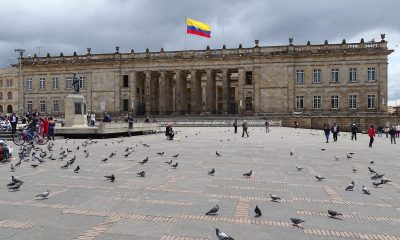World
LGBTQ Venezuelan migrants in Colombia struggle to survive
People with HIV again suffering from Kaposi’s sarcoma
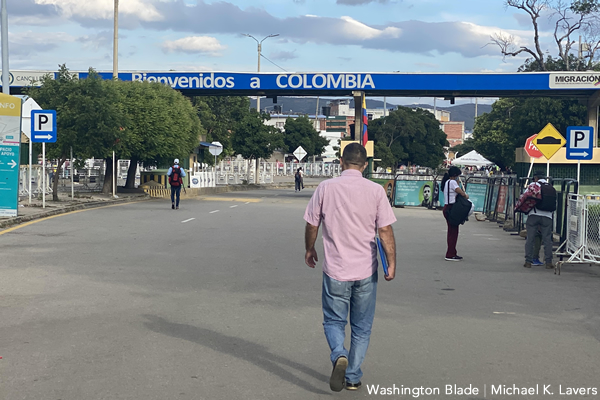
BOGOTÁ, Colombia — Edgar García and his partner, Dannys Torres, on Oct. 3, 2018, used a canoe to cross the Arauca River that marks the Venezuela-Colombia border.
García was a member of the board of directors of Alianza Lambda de Venezuela, a Venezuelan LGBTQ rights group, before he fled Venezuela. Torres worked as a hairdresser in Caracas, the Venezuelan capital.
The couple now lives in Rafael Uribe Uribe, a working-class neighborhood in Bogotá, the Colombian capital.
Torres continues to work as a hairdresser. García most recently worked for a telecommunications company.
“We are settled here in Bogotá,” García told the Washington Blade on Sept. 21 during an interview with him and Torres that took place at a shopping mall near their home. “You have your life here.”
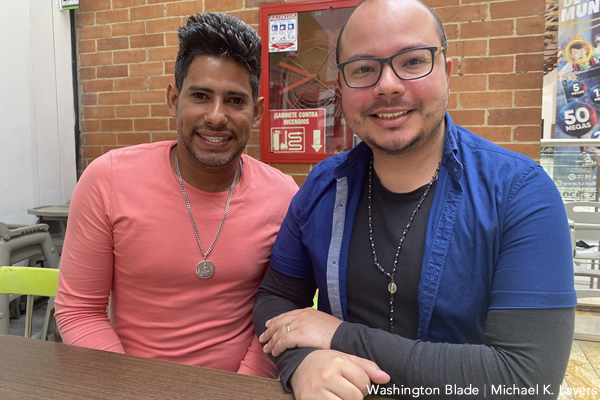
García and Torres are two of the more than 5.4 million Venezuelans who the Coordination Platform for Migrants and Refugees from Venezuela say have left their country as of November 2020 because of its ongoing economic and political crises.
Statistics from the Colombian government indicate there are currently more than 1.7 million Venezuelans in the country. More than 50 percent of them live in Bogotá and the departments of Norte de Santander, Atlántico and Antioquia.
Colombian President Iván Duque in February announced the country would legally recognize Venezuelan migrants who are registered with the government.
Sources in Colombia with whom the Blade has spoken say there are likely many more Venezuelan migrants in the country than official statistics indicate. Venezuelan migrants who are LGBTQ and/or living with HIV remain disproportionately vulnerable to discrimination and violence and often lack access to health care and formal employment.
A report the Red de Movilidad Humana LGBTI+—a network of advocacy groups in Venezuela, Colombia, Ecuador, Peru, Chile, Brazil, Argentina, Guatemala and Mexico—published with the support of the U.N. Refugee Agency notes sex trafficking and even death are among the myriad threats that LGBTQ migrants from Venezuela face once they enter Colombia. The report indicates they also face discrimination in shelters because of their sexual orientation and gender identity, sexual violence and a lack of access to the Colombian judicial system.
Trans woman left Venezuela ‘in search of a better quality of life’
Vanesa, a 25-year-old transgender woman from the Venezuelan city of Maracaibo, came to Colombia eight years ago “in search of a better quality of life.”
She told the Blade on Sept. 14 during an interview at Fundación de Atención Inclusiva, Social y Humana (FUVADIS)—an organization in Barranquilla, a city in Atlántico department that is near the mouth of the Magdalena River in northern Colombia, that serves Venezuelan migrants—she entered Colombia near Maicao, a city in La Guajira department via an informal border crossing known as a “trocha.” Vanesa said she was nearly kidnapped.
“The people who were standing on the sides (of the “trocha”) who ask you for money were supposedly security,” she said. “There was no security. They left me there because I was trans. They said a lot of ugly things. They assaulted me, including one (man) who was not going to let me go. They wanted me to kidnap me or have me there to do whatever they wanted to me.”
Vanesa said a woman helped her escape.
“The experience was horrible,” she said.
Vanesa traveled to Cartagena, a popular tourist destination that is less than two hours southwest of Barranquilla, and began to work at her friend’s hair salon. Vanesa told the Blade that her friend’s mother “never liked me because … she is a Christian.”
Vanesa now lives in Barranquilla and supports herself through video chats. Vanesa also competes in local beauty pageants and is able to send money to her mother in Venezuela.
“I work here,” she said. “I am relatively well off.”
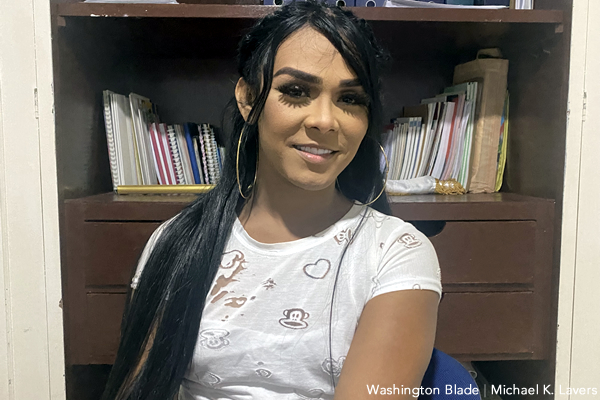
Andy, a trans man from Venezuela’s Maracay state, left Venezuela four years ago with his partner and their daughter. Andy, like Vanesa, entered Colombia via a “trocha” near Maicao.
“I migrated because the situation was becoming worse and worse each day,” Andy told the Blade on Sept. 14 as he attended a workshop that Caribe Afirmativo, an LGBTQ group in northern Colombia, organized at a Barranquilla hotel.
Caribe Afirmativo has opened three “Casas Afirmativos” in Barranquilla, Maicao and Medellín that provide access to health care and other services to Venezuelan migrants who are LGBTQ and/or living with HIV/AIDS. Caribe Afirmativo also operates several “Casas de Paz” throughout northern Colombia that support the implementation of an LGBTQ-inclusive peace agreement between the government and the Revolutionary Armed Forces of Colombia that came into force in 2016.
Andy said his work in Venezuela allowed him to learn how “to sell whatever product,” but he told the Blade he struggled to find a job once he arrived in Colombia.
Andy told the Blade that he, his partner and their daughter now have stable housing in Barranquilla. Andy said he also has received a job offer in Medellín, the country’s second-largest city that is the capital of Antioquia department.
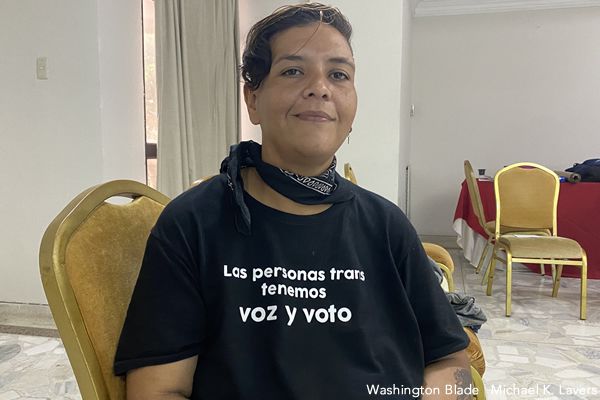
Jesús Gómez is a 33-year-old gay man from Venezuela’s Trujillo state in the Venezuelan Andes that are close to the country’s border with Colombia.
He previously worked with Venezuela Diversa, a Venezuelan LGBTQ advocacy group, and accepted a position with the municipality of Chacao that is part of Caracas. Gómez, whose mother was born in Colombia, also joined a student protest movement against the government.
Gómez fled to Colombia and is pursuing his asylum case with the help of UNHCR.
“I feel bad emotionally, but I am well-off compared to other people,” he told the Blade on Sept. 16 during an interview at a hotel in Cúcuta, a city in Norte de Santander department that is a few miles from the country’s border with Venezuela. “I am working to help other people who are in the same situation.”
Gómez in December is scheduled to graduate from nursing school. He also works with Fundación Censurados, a Cúcuta-based HIV/AIDS service organization that works with Venezuelan migrants, and has supported other organizations in the area that serve them.
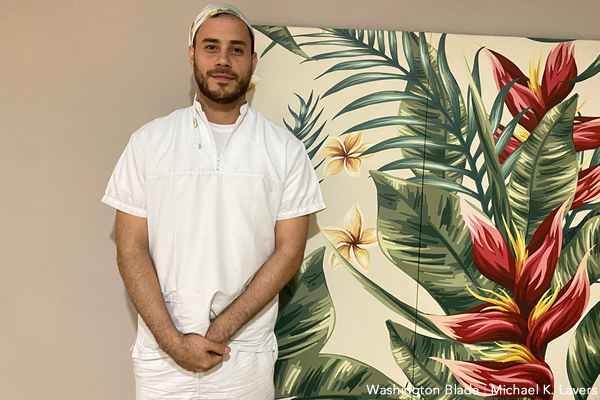
FUVADIS Executive Director Luis Meneses, like Gómez, was an LGBTQ activist in Venezuela.
Meneses, who is from Venezuela’s Zulia state, in 2010 unsuccessfully ran for Venezuela’s National Assembly. Meneses in February 2018 fled to Colombia because of the “political persecution” he said he suffered.
“Discrimination and prejudice against me began when I came out to defend LGBTI rights,” Meneses told the Blade on Sept. 14 during an interview at his office.
Meneses in August 2018 launched FUVADIS, which receives support from groups that includes UNHCR and the International Organization for Migration. FUVADIS provides health care, antiretroviral drugs and a host of other services to Venezuelan migrants with HIV/AIDS and other populations that include sex workers. Vanessa and nearly 900 other FUVADIS clients are LGBTQ.
“We cannot work for the migrant population by only giving them humanitarian assistance,” said Meneses. “It’s also about guaranteeing access to their rights.”
Venezuelans with HIV/AIDS die because of lack of medications
The New York-based Aid for AIDS International estimates more than 10,000 Venezuelans with HIV have left the country in recent years. Activists and health care service providers in Venezuela with whom the Blade has spoken in recent years have said people with HIV/AIDS in the country have died because of a lack of antiretroviral drugs.
The Venezuelan government has also targeted HIV/AIDS service organizations.
Members of Venezuela’s General Directorate of Military Counterintelligence in January raided the offices of Azul Positivo, an HIV/AIDS service organization and arrested President Johan León Reyes and five other staff members. Venezuelan police on Feb. 15, 2019, raided the offices of Fundación Mavid, another HIV/AIDS service organization in Valencia, a city in Carabobo state, and arrested three staffers after they confiscated donated infant formula and medications for people with HIV/AIDS
Deyvi Galvis Vásquez, a doctor who is the manager of prevention and testing for AIDS Healthcare Foundation Colombia on Sept. 17 during an interview at AHF’s Cúcuta clinic showed the Blade pictures of Venezuelans with HIV/AIDS in Colombia who had cases of Kaposi’s sarcoma.
“The conditions are of extreme vulnerability,” said Galvis.
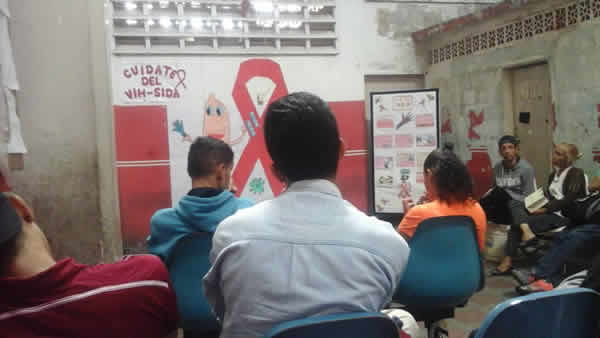
Andrés Cardona, director of Fundación Ancla, a Medellín-based group that works with migrants and other vulnerable groups, during a Sept. 13 interview with the Blade in his office echoed Galvis. Cardona added stigma specifically against Venezuelans with HIV/AIDS is one of the myriad issues he and his colleagues confront.
“The issue of the elimination of HIV also implies not only an issue of communication and prevention, but also an issue of effective attention,” said Cardona. “We have our conservative culture, an idea that the Venezuelans who are coming are going to give us HIV.”
“This is totally discriminatory,” he added.
Cardona, like those inside Venezuela with whom the Blade has spoken, said there are no services in the country for people with HIV/AIDS.
“There are many Venezuelan migrants with HIV who enter Colombia, because they are going to die if they don’t,” he said.
AHF operates clinics throughout Colombia
AHF operates other facilities in Bogotá and in the cities of Bucaramanga, Yopal, Valledupar and Ríohacha. The organization, along with the Colombian Red Cross and the government of Santander department, in March began to distribute condoms, food and water and offer rapid HIV tests to Venezuelan migrants who travel through Páramo de Berlín, a high plateau in the Colombian Andes through which a highway between Cúcuta and Bucaramanga passes.
AHF, among other things, offers migrants rapid HIV and syphilis tests and counseling for people who test positive. AHF also provides lab tests, formula for children of mothers with HIV and health care with an “interdisciplinary health care team.”
AHF Colombia Country Program Manager Liliana Andrade Forero and AHF Colombia Data Manager Sandra Avila Mira on Sept. 20 noted to the Blade during an interview at AHF’s Bogotá clinic that upwards of 2,000 migrants currently receive care from the organization. They also pointed out that 1,952 of them are taking antiretroviral drugs the Brazilian government donates.
Galvis noted to the Blade that many of AHF’s patients also have access to mental health care and social workers.
“AHF’s policy is to reach out to everyone,” he said.
Pandemic has made migrants even more vulnerable
Galvis, Fundación Censurados Director Juan Carlos Archila and other Colombian HIV/AIDS service providers with whom the Blade spoke say the pandemic has made Venezuelan migrants with HIV/AIDS in the country even more vulnerable.
Lockdowns prevented sex workers and others who work in the informal economy from earning money. A “pico y género” rule implemented by Bogotá Mayor Claudia López that allowed women to leave their homes on even days and men to leave their homes on odd days sparked criticism among trans activists.
Archila, who is a nurse, on Sept. 16 told the Blade during an interview at a Cúcuta hotel the pandemic has also left Censurados in a precarious situation.
“We endured practically two years with the doors closed, with expenses increasing,” he said. “The need of people who come to us for the issue of HIV remains, and yet we are all trying to cope with the situation.”
Andrade noted AHF’s Bogotá was closed for several months at the beginning of the pandemic because of the city’s strict lockdown.
The pandemic also forced FUVADIS to close its offices in March 2020, but Meneses told the Blade the organization was able to see a handful of patients at a time. He said “basic humanitarian assistance” that included hygiene kits and food were among the things that FUVADIS was able to provide its patients during the pandemic.
“Understanding how the situation for the LGBTI community, people with HIV, the migrant population and the refugee population is, we could not allow (our services) to shut down,” Meneses told the Blade.
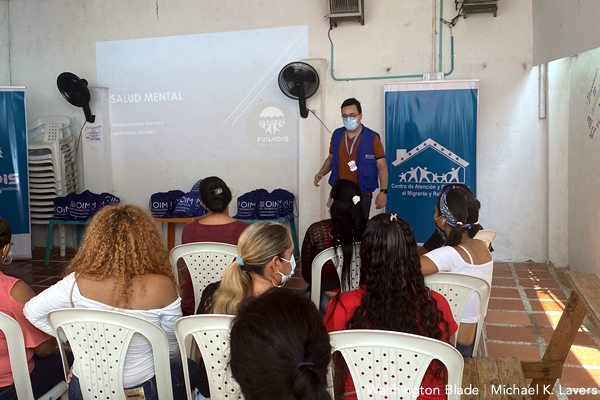
Israel
Activist recalls experience in Tel Aviv after Israel-Iran war began
Marty Rouse was part of Jewish Federations of North America Pride mission

A long-time activist who was in Israel last month when its war with Iran began has returned to D.C.
Marty Rouse traveled to Israel on June 6 with the Jewish Federations of North America. The 5-day mission ended the night before the annual Tel Aviv Pride parade was scheduled to take place.
Mission participants met with Israeli President Isaac Herzog and several LGBTQ activists in Tel Aviv and Jerusalem. They visited the Western Wall, the Nova Music Festival site, and Nir Oz, a kibbutz in southern Israel that is less than a mile from the country’s border with the Gaza Strip. Mission participants also visited Sderot, a city that is roughly a mile from the Hamas-controlled enclave, a veterans rehabilitation facility, a new LGBTQ health center and the Aguda: The Association for LGBTQ Equality in Israel in Tel Aviv.
Hamas militants on Oct. 7, 2023, killed upwards of 360 partygoers and kidnapped dozens more at the music festival that was taking place at a campground near Re’im, a kibbutz that is roughly 10 miles southwest of Nir Oz. The militants killed or took hostage nearly a quarter of Nir Oz’s residents. They also took control of Sderot’s police station.

Tel Aviv Deputy Mayor Chen Arieli spoke at the mission’s closing party that took place at the Sheraton Grand, a hotel that overlooks Tel Aviv’s beachfront, on June 12.
Rouse and other mission participants planned to stay in Tel Aviv for the Pride parade, which was scheduled to take place the following day. He and Gordie Nathan, another mission participant who lives in Palm Springs, Calif., had checked into a nearby hotel that was less expensive.
“We said our farewells,” recalled Rouse when he spoke with the Washington Blade in D.C. on June 24. “We went to our hotels, and we get the warning, and then all hell broke loose.”
Israel early on June 13 launched airstrikes against Iran that targeted the country’s nuclear and military facilities.
Rouse said mission organizers told him and other participants who remained in Tel Aviv to meet at the Sheraton Grand for breakfast and dinner — Israel’s airspace was closed in anticipation of an Iranian counterattack, and authorities cancelled the Pride parade.
He said he went to bomb shelters at least twice a night for three nights.
Israel’s Home Front Command during the war typically issued warnings about 10 minutes ahead of an anticipated Iranian missile attack. Sirens then sounded 90 seconds before an expected strike.
Rouse and Nathan walked to the Sheraton Grand on June 13 when the Home Front Command issued a 10-minute warning. They reached the hotel in a couple of minutes, and staff directed them to the bomb shelter.
“You know to walk slowly, everything’s fine,” recalled Rouse. “You get 10 minutes, so everything was fine when the alarm goes off.”
Rouse described the Sheraton Grand shelter as “well lit” with WiFi, a television, and air conditioning. He was watching an Israeli television station’s live coverage of the Iranian missile attack when he saw one hit an apartment building in the Tel Aviv suburb of Ramat Gan.
A 74-year-old woman died and her boyfriend was seriously injured.
“I go over to look at the TV, just to watch,” recalled Rouse. “All of a sudden, you watch, and you see one bomb go and land and explode in Tel Aviv on TV. It landed and blew up.”
“I was like, okay, this is real, and so that was scary,” he added.
Rouse said the bomb shelter in the hotel where he and Nathan were staying after the mission ended was far less comfortable.
“It was dark. It was humid. It was hot. It was very uncomfortable,” said Rouse. “You really felt alone.”

Rouse and nearly everyone else on the mission who were in Tel Aviv when the war began left Israel on June 15. They boarded buses that took them to the Jordanian capital of Amman, which is a roughly 2 1/2-hour drive from Tel Aviv through the West Bank.
Rouse described the trip as “like a field trip” until they drove across the Jordan River and arrived at the Jordanian border crossing.
“You walk into this room, and instead of being in a well air-conditioned airport, you’re in this hot, humid, small place in the middle of the desert, packed with people, and those big, large, loud fans and pictures of military people on the walls,” he said. “It was almost like a Casablanca kind of feeling.”
Rouse said Jordanian authorities brought mission participants through customs in groups of 10. A Jewish Federations of North America liaison from Amman who previously worked as a tour guide for A Wider Bridge — a group that “advocates for justice, counters LGBTQphobia, and fights antisemitism and other forms of hatred” — went “behind closed doors” to ensure everyone was able to enter the country.
“It took a really long time,” Rouse told the Blade.

Mission participants arrived in Amman a short time later. They checked into their hotel and then had dinner at a restaurant.
“Now we feel like we’re safe and we’re in Amman,” recalled Rouse. “We’re sitting outside having a beautiful dinner.”
Iranian missiles passed over Amman shortly after Rouse and the other mission participants had begun to eat their dessert. They went inside the restaurant, and waited a few minutes before they boarded busses that brought them back to their hotel.
“No one was openly freaking out, which I was surprised by,” said Rouse.
The group was scheduled to fly from Amman to Cairo at 11 p.m. local time (4 p.m. ET) on June 16. They visited Jerash, an ancient city north of Amman, before their flight left Jordan.
“[The Jerash trip] actually took our minds off of everything,” said Rouse.
A Jewish Federations of North America contact met Rouse and the other mission participants at Cairo’s airport once their flight landed. Rouse arrived at JFK Airport in New York on June 17.
Trump-announced ceasefire ended 12-day war
President Donald Trump on June 23 announced a ceasefire that ended the 12-day war.
The U.S. three days earlier launched airstrikes that struck three Iranian nuclear sites. The ceasefire took effect hours after Iran launched missiles at a U.S. military base in Qatar.
Iran said the war killed more than 900 people in the country.
The Associated Press notes Iranian missiles killed 28 people in Israel. One of them destroyed Tel Aviv’s last gay bar on June 16.
The war took place less than two years after Oct. 7.
The Israeli government says Hamas militants on Oct. 7, 2023, killed roughly 1,200 people on that day when it launched its surprise attack on the country. The militants also kidnapped more than 200 people.
The Hamas-controlled Gaza Health Ministry says Israeli forces have killed nearly 55,000 people in the enclave since Oct. 7. Karim Khan, the International Criminal Court’s chief prosecutor, has said Israeli Prime Minister Benjamin Netanyahu and former Hamas leader Yahya Sinwar, who the IDF killed last October, are among those who have committed war crimes and crimes against humanity in Gaza and Israel.

Rouse upon his return to the U.S. said he “was never as aware of the comfort of another human being than I was during that time.” Rouse affectionately called Nathan his “bomb shelter boyfriend” and even questioned the way he reacted to the missile alerts.
“He’s sitting on the edge of the bed and he goes, okay, I’m going to put on my socks and my shoes, and I say, really? You’re going to put on your socks,” Rouse told the Blade. “The fact that I was nervous, that putting on socks might have changed the direction of our lives, to me was like I can’t believe I said that to him.”
Rouse quickly added Nathan helped him remain calm.
“If I was by myself, those nights would have been long enough,” said Rouse. “It’s a totally different feeling to be with another human that you know than to be by yourself.”

Rouse also praised the Jewish Federations of North America.
“JFNA really sprung into action and started to figure out all options to get us all safely home,” said Rouse. “It was all about logistics. Staff worked around the clock identifying and then mobilizing to get us back to the states. It was a great team effort and I know I speak for everyone in expressing our deep appreciation for their dedication to getting us safely home.”
Latin America
Protests, demands for rights define Pride month in Latin America
More than 3 million people participated in São Paulo march

Activists across Latin America marked Pride month with massive demonstrations, cultural activities, and demands that their countries guarantee equality and protect LGBTQ people from violence.
From Santiago, Chile, to Mexico City, activists took to the streets to celebrate the rights that have been won and the many that are still pending.
Chile
The Pride march that the Movement for Homosexual Integration and Liberation (Movilh) and Fundación Iguales organized took place in downtown Santiago, the country’s capital, on June 22. Authorities and the two organizations say more than 120,000 people participated.
Under the slogan “Pride with memory and hope,” marchers demanded lawmakers approve a bill that would allow reparations for LGBTQ Chileans who Gen. Augusto Pinochet’s dictatorship targeted. There were also calls for the government to promote an LGBTQ-inclusive educational reform.
“This time we are marching on high alert,” said Movilh spokesperson Javiera Zúñiga. “For the first time in decades, we are losing achieved rights. We demand the state wake up. The reform of the Zamudio Law has been stalled for 13 years.”
Marches also took place in Valparaíso, Antofagasta, Temuco, and Concepción, highlighting the growing visibility of transgender groups and feminist organizations.
Mexico
Mexico City on June 29 was the epicenter of one of the region’s largest Pride marches.
More than 300,000 people participated in the march. Comité IncluyeT organized the 46th annual march under the slogan “Not one step back: rights are respected.”
Several organizations denounced the increase in hate crimes — Mexico’s National Observatory of Hate Crimes notes more than 80 LGBTQ people have been reported murdered in the last year. They also urged Mexican lawmakers to criminalize transfeminicides across the country.
Argentina
Although Buenos Aires’s official Pride march takes place in November, the Argentine LGBT+ Federation and other groups in the Argentine capital and in other cities across the country in June organized activities.
More than 5,000 people on June 24 marched from Plaza de Mayo to the Argentine Congress to reject the government’s dismantling of public policies. President Javier Milei’s decision to eliminate the country’s Women, Gender, and Diversity Ministry and cut sexual health programs were among the moves the protesters denounced.
“Today Pride is also resistance to the adjustment,” pointed out Comunidad Homosexual Argentina, an LGBTQ advocacy group.

Colombia
Thousands of people in Bogotá, the Colombian capital, and the cities of Medellín, Cali, and Barranquilla marched on June 29.
The marchers’ slogan was “diversity is also peace,” in a context where violence against LGBTQ people remains high. Caribe Afirmativo, a Colombian LGBTQ rights group, notes more than 45 people from the community has been reported killed in the country over the last 12 months, with most of them trans women.
Organizations also demanded lawmakers resume debate of a bill that would extend comprehensive protections to LGBTQ Colombians. The measure has been stalled in Congress since 2023.
Brazil
More than 3 million people participated in the 28th São Paulo LGBTQ+ Pride Parade that took place on the city’s Paulista Avenue on June 22.
The parade took place under the slogan “LGBT+ social policies: we want the whole thing, not half of it.” Organizers demanded expanded access to health care, employment, and education for the most vulnerable communities, especially Black trans people. They also denounced ultraconservative figures who seek to curtail LGBTQ rights.
Peru and Paraguay
More than 15,000 people took part in a Pride march in Lima, the Peruvian capital, on June 28. Participants demanded lawmakers approve a trans rights law, which has been stalled in the Peruvian Congress since 2016, and recognition of civil unions.
Members of SomosGay, a Paraguayan LGBTQ rights group, and other organizations participated in a Pride march that took place in Asunción, the country’s capital, on June 29.
The march took place without incident, despite threats and anti-LGBTQ hate speech on social media. Participants demanded an end to anti-LGBTQ discrimination and rhetoric from social and religious groups.
Central America
Upwards of 2,000 people participated in a Pride march in Tegucigalpa, the Honduran capital, on June 22. A Pride demonstration took place in San Salvador, the capital of neighboring El Salvador, on June 28.
India
Anaya Bangar challenges ban on trans women in female cricket teams
Former Indian cricketer Sanjay Bangar’s daughter has received support

Anaya Bangar, the daughter of former Indian cricketer Sanjay Bangar, has partnered with the Manchester Metropolitan University Institute of Sport in the U.K. to assess her physiological profile following her gender-affirming surgery and undergoing hormone replacement therapy.
From January to March 2025, the 23-year-old underwent an eight-week research project that measured her glucose levels, oxygen uptake, muscle mass, strength, and endurance after extensive training.
The results, shared via Instagram, revealed her metrics align with those of cisgender female athletes, positioning her as eligible for women’s cricket under current scientific standards. Bangar’s findings challenge the International Cricket Council’s 2023 ban on transgender athletes in women’s cricket, prompting her to call for a science-based dialogue with the Board of Control for Cricket in India and the ICC to reform policies for trans inclusion.
“I am talking with scientific evidence in my hand,” Bangar said in an interview posted to her Instagram page. “So, I hope, this makes an impact and I will be hoping to BCCI and ICC talking with me and discussing this further.”
On Nov. 21, 2023, the ICC enacted a controversial policy barring trans women from international women’s cricket. Finalized after a board meeting in Ahmedabad, India, the regulation prohibits any trans player who has experienced male puberty from competing, irrespective of gender-affirming surgery or hormone therapy. Developed through a 9-month consultation led by the ICC’s Medical Advisory Committee, the rule aims to safeguard the “integrity, safety, and fairness” of women’s cricket but has drawn criticism for excluding athletes like Canada’s Danielle McGahey, the first trans woman to play internationally. The policy, which allows domestic boards to set their own rules, is slated for review by November 2025.
Bangar shared a document on social media verifying her participation in a physiological study at the Manchester Metropolitan University Institute of Sport, conducted from Jan. 20 to March 3, 2025, focused on cricket performance. The report confirmed that her vital metrics — including hemoglobin, blood glucose, peak power, and mean power — aligned with those of cisgender female athletes. Initially, her fasting blood glucose measured 6.1 mmol/L, slightly above the typical non-diabetic range of 4.0–5.9 mmol/L, but subsequent tests showed it normalized, reinforcing the study’s findings that her physical profile meets female athletic standards.
“I am submitting this to the BCCI and ICC, with full transparency and hope,” said Bangar. “My only intention is to start a conversation based on facts not fear. To build space, not divide it.”
In a letter to the BCCI and the ICC, Bangar emphasized her test results from the Manchester Metropolitan University study. She explained that the research aimed to assess how hormone therapy had influenced her strength, stamina, hemoglobin, glucose levels, and overall performance, benchmarked directly against cisgender female athletic standards.
Bangar’s letter to the BCCI and the ICC clarified the Manchester study was not intended as a political statement but as a catalyst for a science-driven dialogue on fairness and inclusion in cricket. She emphasized the importance of prioritizing empirical data over assumptions to shape equitable policies for trans athletes in the sport.
Bangar urged the BCCI, the world’s most influential cricket authority, to initiate a formal dialogue on trans women’s inclusion in women’s cricket, rooted in medical science, performance metrics, and ethical fairness. She called for the exploration of eligibility pathways based on sport-specific criteria, such as hemoglobin thresholds, testosterone suppression timelines, and standardized performance testing. Additionally, she advocated for collaboration with experts, athletes, and legal advisors to develop policies that balance inclusivity with competitive integrity.
“I am releasing my report and story publicly not for sympathy, but for truth. Because inclusion does not mean ignoring fairness, it means measuring it, transparently and responsibly,” said Bangar in a letter to the BCCI. “I would deeply appreciate the opportunity to meet with you or a representative of the BCCI or ICC to present my findings, discuss possible policy pathways, and work towards a future where every athlete is evaluated based on real data, not outdated perceptions.”
Before her transition, Bangar competed for Islam Gymkhana in Mumbai and Hinckley Cricket Club in the U.K., showcasing her talent in domestic cricket circuits. Her father, Sanjay Bangar, was a dependable all-rounder for the Indian national cricket team from 2001 to 2004, playing 12 test matches and 15 One Day Internationals. He later served as a batting coach for the Indian team from 2014 to 2019, contributing to its strategic development.
Cricket in India is a cultural phenomenon, commanding a fanbase of more than 1 billion, with more than 80 percent of global cricket viewership originating from the country.
The International Cricket Council, the sport’s governing body, oversees 12 full member nations and more than 90 associate members, with the U.S. recently gaining associate member status in 2019 and co-hosting the 2024 ICC Men’s T20 World Cup. The BCCI generated approximately $2.25 billion in revenue in the 2023–24 financial year, primarily from the Indian Premier League, bilateral series, and ICC revenue sharing. The ICC earns over $3 billion from media rights in India alone for the 2024–27 cycle, contributing nearly 90 percent of its global media rights revenue, with the BCCI receiving 38.5 percent of the ICC’s annual earnings, approximately $231 million per year.
Women’s cricket in India enjoys a growing fanbase, with over 300 million viewers for the Women’s Premier League in 2024, making it a significant driver of the sport’s global popularity. The International Cricket Council oversees women’s cricket in 12 full member nations and over 90 associate members, with the U.S. fielding a women’s team since gaining associate status in 2019 and competing in ICC events like the 2024 Women’s T20 World Cup qualifiers. The BCCI invests heavily in women’s cricket, allocating approximately $60 million annually to the WPL and domestic programs in 2024–25, while contributing to the ICC’s $20 million budget for women’s cricket development globally. India’s media market for women’s cricket, including WPL broadcasting rights, generated $120 million in 2024, accounting for over 50 percent of the ICC’s women’s cricket media revenue.
“As a woman, I feel when someone says that they are women, then they are, be trans or cis. A trans woman is definitely the same as a cis woman emotionally and in vitals, and specially, when someone is on hormone replacement therapy. Stopping Anaya Bangar from playing is discrimination and violation of her rights. It is really sad and painful that every trans woman need to fight and prove their identity everywhere,” said Indrani Chakraborty, an LGBTQ rights activist and a mother of a trans woman. “If ICC and BCCI is stopping her from playing for being transgender, then I will say this to be their lack of awareness and of course the social mindsets which deny acceptance.”
Chakraborty told the Blade that Bangar is an asset, no matter what. She said that the women’s cricket team will only benefit by participation, but the discriminating policies are the hindrance.
“Actually the transgender community face such discrimination in every sphere. In spite of being potent, they face rejection. This is highly inhuman. These attitudes is regressive and will never let to prosper. Are we really in 2025?,” said Chakraborty. “We, our mindset and the society are the issues. We, as a whole, need to get aware and have to come together for getting justice for Anaya. If today, we remain silent, the entire community will be oppressed. Proper knowledge of gender issues need to be understood.”
The BCCI and the International Cricket Council have not responded to the Blade’s repeated requests for comment.
-

 U.S. Supreme Court2 days ago
U.S. Supreme Court2 days agoSupreme Court to consider bans on trans athletes in school sports
-

 Out & About2 days ago
Out & About2 days agoCelebrate the Fourth of July the gay way!
-

 Virginia2 days ago
Virginia2 days agoVa. court allows conversion therapy despite law banning it
-

 Maryland4 days ago
Maryland4 days agoLGBTQ suicide prevention hotline option is going away. Here’s where else to go in Md.

